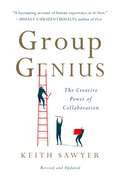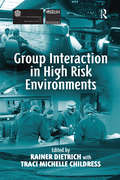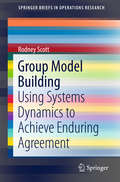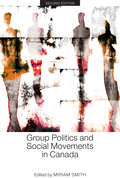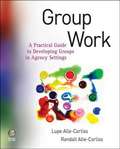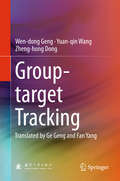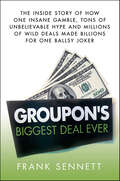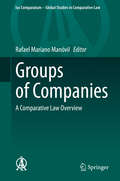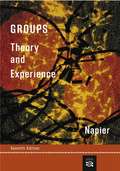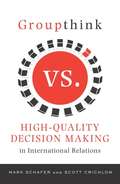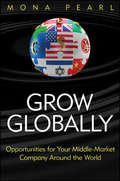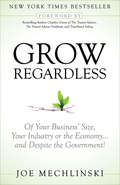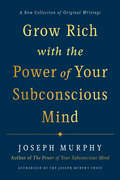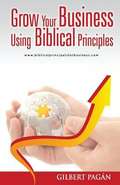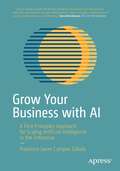- Table View
- List View
Group Genius: The Creative Power of Collaboration
by Keith SawyerCreativity has long been thought to be an individual gift, best pursued alone; schools, organizations, and whole industries are built on this idea. But what if the most common beliefs about how creativity works are wrong? Group Genius tears down some of the most popular myths about creativity, revealing that creativity is always collaborative-even when you're alone. Sharing the results of his own acclaimed research on jazz groups, theater ensembles, and conversation analysis, Keith Sawyer shows us how to be more creative in collaborative group settings, how to change organizational dynamics for the better, and how to tap into our own reserves of creativity.
Group Genius: The Creative Power of Collaboration
by Keith SawyerCreativity has long been thought to be an individual gift, best pursued alone; schools, organizations, and whole industries are built on this idea. But what if the most common beliefs about how creativity works are wrong? In this authoritative and fascinating new book, Keith Sawyer, a psychologist at Washington University, tears down some of the most popular myths about creativity and erects new principles in their place. He reveals that creativity is always collaborative-even when you’re alone. (That "eureka” moment in the bathtub couldn’t have come to Archimedes if he hadn’t spent so many hours arguing and comparing notes with his fellow mathematicians and philosophers. ) Sawyer draws on compelling stories of inventions and innovations: the inventors of the ATM, the mountain bike, and open source operating systems, among others, to demonstrate the freewheeling ways of true innovation. He shares the results of his own acclaimed research on jazz groups, theater ensembles, and conversation analysis, to show us how to be more creative in collaborative group settings, how to change organizational dynamics for the better, and how to tap into our own reserves of creativity.
Group Interaction in High Risk Environments
by Rainer Dietrich Traci Michelle ChhildressWhat governs the way in which people work together and handle technology in high risk environments? The understanding of decision making, communication and the other dimensions of team interaction within aircrews and other teams in highly stressful situations, is based on a multitude of diverse factors, each with its own literature and individual studies. This book is about how teams function in just such situations, providing a uniquely integrated and interdisciplinary account of the dynamics and main explanatory factors of team interaction under high workload. The book stems from the interdisciplinary research project 'Group Interaction in High Risk Environments' (GIHRE), a Collegium of the Gottlieb Daimler and Karl Benz Foundation. The goals of the project, and therefore the book, are to investigate, analyze and understand the behavior of professional groups working in high risk environments and to develop practical suggestions for enhancing performance. A central focus of this book is how groups in these professions deal with the factors that can threaten the safety and effectiveness of their task performance, whether these factors are part of the environment or part of the team itself. Four representative workplaces were investigated in three broad settings: in aviation, the cockpit of a commercial airliner; in medicine, the operating room and the intensive care unit of a hospital; in nuclear power, the control room of a nuclear power plant. The international and interdisciplinary composition of the Collegium ensures the book features a variety of different methodological and conceptual approaches, which are brought to bear at both theoretical and practical levels. Readers working in all related fields will find value in the case descriptions, the academic synthesis of the similarities between them, and ways to approach new challenges; specialists in applied psychology, human factors and technical management will gain new insights.
Group Model Building: Using Systems Dynamics to Achieve Enduring Agreement (SpringerBriefs in Operations Research)
by Rodney ScottThis book describes the cognitive and interpersonal effects of group model building, and presents empirical research on what group model building achieves and how. Further, it proposes an integrated causal mechanism for the effects on participants. There have been multiple previous attempts at explaining the effects of group model building on participants, and this book integrates these various theories for the first time.The causal mechanisms described here suggest a variety of design elements that should be included in group model building practice. For example, practitioners typically try to reduce complexity for clients, to make the process feel more accessible. In contrast, the findings presented here suggest that the very act of muddling through complexity increases participants’ affective commitment to the group and the decisions made.The book also describes implications for theory and practice. System dynamics has traditionally been interested in using technical modeling processes to make policy recommendations. Group model building demonstrates that these same techniques also have implications for group decision making as a method for negotiating agreement. The book argues for the value of group model building as a mediating or negotiating tool, rather than merely a positivist tool for technical problems.
Group Politics and Social Movements in Canada, Second Edition
by Miriam SmithGroup Politics and Social Movements in Canada, Second Edition updates and expands its exploration of a wide range of organized group and social movement activity in Canadian politics. Particularly distinctive is the inclusion of Quebec nationalism and Aboriginal politics. Many other areas of collective activity are also included: the Occupy movement and anti-poverty organizing, ethnocultural political mobilization, disability, lesbian and gay politics, feminism, farmers and organized interests in agriculture, Christian evangelical groups, environment, and health movements. Contributors to the collection employ a number of theoretical perspectives from political science and sociology to describe the evolution of organized groups and movements and to evaluate successes in exercising influence on Canadian politics. Each chapter provides an overview of the group or movement along with an account of its main networks and organizations, strategies, goals, successes, and failures.
Group Process in the Challenger Launch Decision (A)
by Amy C. Edmondson Laura R. FeldmanThe night before the launch of the Challenger shuttle, officials from Morton Thiokol (Solid Rocket Booster manufacturer) and NASA participated in a teleconference to discuss whether to postpone the shuttle launch due to predicted low temperatures at Kennedy Space Center. This case provides background on the history of NASA's shuttle program, engineering firm Thiokol and Thiokol SRB, and O-ring expert Roger Boisjoly, who was adamant that the shuttle not be launched.
Group Process in the Challenger Launch Decision (B)
by Amy C. Edmondson Laura R. FeldmanSupplements the (A) case.
Group Process in the Challenger Launch Decision (C)
by Amy C. Edmondson Laura R. FeldmanSupplements the (A) case.
Group Process in the Challenger Launch Decision (D)
by Amy C. Edmondson Laura R. FeldmanSupplements the (A) case.
Group Work
by Lupe Alle-Corliss Randall Alle-CorlissThorough, hands-on guidance for conducting group work in nonprofit, public, and for-profit agency settings.Because it improves access, is cost-effective, and can be modified to conform to evidence-based practice, group work has become the treatment approach of choice in a broad range of human service agencies. Written in an approachable manner that allows for direct translation of concepts into practice, Group Work: A Practical Guide to Developing Groups in Agency Settings provides a dual emphasis on clinical group skills along with a thorough understanding of agency systems that is necessary to meet the demands of today's practice settings.Written by two experts in the field, this book offers:Practical, detailed, ready-to-use group treatment plans, including group objectives, weekly session guidelines, discussion topics, activities, relevant research, and other essential toolsCoverage of the three major types of agencies--nonprofit, public, and for-profit--supported by research and evidence-based treatments that reflect practitioners' actual experiencesA unique agency perspective that includes coverage of agency structure, policies, history, staff, politics, informal and formal norms, and diverse client populationsGroup Work also contains a resourceful CD-ROM with over fifty different Group Profiles that can be customized to suit clients' unique styles and needs. Addressing a wide variety of psychological issues frequently encountered in therapy work with groups,¿the Group Profiles cover a range of clients across the lifespan--children, adolescents, adults, older adults, and the medically ill. Topics covered in these Group Profiles include anxiety, depression, divorce adjustment, substance abuse, foster care, trauma, chronic pain, anger management, hospice, weight management/obesity prevention, teen pregnancy, HIV/AIDS, and many more.Clear, concise, and current, Group Work: A Practical Guide to Developing Groups in Agency Settings is a useful resource from which professionals will gain the knowledge, skills, and awareness of the many intricacies involved in working with diverse groups within different agency settings. Its easy-to-follow presentation will enable all mental health professionals to successfully apply a variety of concepts, ideas, and skills into their group work practice.Note: CD-ROM/DVD and other supplementary materials are not included as part of eBook file.
Group-target Tracking
by Wen-Dong Geng Yuan-Qin Wang Zheng-Hong DongThis book describes grouping detection and initiation; group initiation algorithm based on geometry center; data association and track continuity; as well as separate-detection and situation cognition for group-target. It specifies the tracking of the target in different quantities and densities. At the same time, it integrates cognition into the application. Group-target Tracking is designed as a book for advanced-level students and researchers in the area of radar systems, information fusion of multi-sensors and electronic countermeasures. It is also a valuable reference resource for professionals working in this field.
Groupe Ariel S.A.: Parity Conditions and Cross-Border Valuation (Brief Case)
by James Quinn Timothy A. LuehrmanGroupe Ariel evaluates a proposal from its Mexican subsidiary to purchase and install cost-saving equipment at a manufacturing facility in Monterrey. The improvements will allow the plant to automate recycling and remanufacturing of toner and printer cartridges, an important part of Ariel's business in many markets. Ariel corporate policy requires a discounted cash flow (DCF) analysis and an estimate for the net present value (NPV) for capital expenditures in foreign markets. A major challenge for the analysis is deciding which currency to use, the Euro or the peso. The case introduces techniques of discounted cash flow valuation analysis in a multi-currency setting and can be used to teach basic international parity conditions related to the value of operating cash flows.
Groupon
by Sunil Gupta Dharmishta Rood Ray WeaverThis case is set in early 2011, after a period of incredible customer and revenue growth for Groupon. Reviewing Groupon's rise, the case explores whether Groupon promotions are really good for local merchants, whether it can continue to thrive amidst increasingly intense competition, and the key reasons for the company's remarkable early success.
Groupon for Local Businesses
by Thales S. Teixeira Leora KornfeldLocal businesses' experiences with using Groupon to promote themselves ran the gamut of roaring success to absolute failure. Why is there such a large range in outcomes for firms that used daily deal sites such as Groupon? This case examines the effectiveness of online daily deal sites from the point of view of local businesses.
Groupon's Biggest Deal Ever: The Inside Story of How One Insane Gamble, Tons of Unbelievable Hype, and Millions of Wild Deals Made Billions for One Ballsy Joker
by Frank SennettThe inside story of the meteoric rise of Groupon from startup to $30 billion online giant and the audacious genius behind it, founder Andrew MasonIn late 2010, Groupon made an incredible gamble. Rather than take Google's $6 billion buyout offer, founder Andrew Mason turned the search giant down and decided to go it alone. The experts thought he was insane. Groupon was little more than two years old and staffed from top to bottom with twenty-somethings. The wild ride couldn't last, but Mason thought otherwise, and with knowledge of a possible IPO he liked his odds. A discount service that offers a deal a day at local merchants in countless cities in more than forty-three countries, Groupon is the fastest-growing company in Internet history and is as committed to innovating a new model for commerce as it is to creating an office culture and editorial voice based on radical transparency and absurd humor. Groupon's Biggest Deal Ever is the exclusive and unparalleled account of the incredible rise of discount giant Groupon and the compelling story of its offbeat founder Andrew Mason as he created a juggernaut of online commerce and ignited a consumer revolution.
Groups of Companies: A Comparative Law Overview (Ius Comparatum - Global Studies in Comparative Law #43)
by Rafael Mariano ManóvilThis book presents a comprehensive study on how twenty-three countries have approached the issue of company groups. In addition to detailed profiles of each country’s legislation, written by some of the most respected experts in the field, the book also presents a general overview and offers readers an in-depth, up-to-date and highly practical comparative analysis of the company group phenomenon in connection with national legal regimes. As such, the book is a must-read for all those seeking a deeper understanding of how company groups are viewed and regulated around the globe.
Groups: Theory and Experience
by Rodney W. Napier Matti K. GershenfeldGroups includes research on group dynamics and current views on ways to make working in groups more effective. Napier and Gershenfeld present complex concepts in a way that makes them more understandable, recognizing that students are more familiar with the dynamics of individual behavior and building on that knowledge to teach group theory. Case studies provide real-life context and exercises engage students in the learning process by asking them to apply what they learn to their own lives.
Groupthink Versus High-Quality Decision Making in International Relations
by Scott Crichlow Mark Schafer-Are good and bad outcomes significantly affected by the decision-making process itself? Indeed they are, in that certain decision-making techniques and practices limit the ability of policymakers to achieve their goals and advance the national interest. The success of policy often turns on the quality of the decision-making process. Mark Schafer and Scott Crichlow identify the factors that contribute to good and bad policymaking, such as the personalities of political leaders, the structure of decision-making groups, and the nature of the exchange between participating individuals. Analyzing thirty-nine foreign-policy cases across nine administrations and incorporating both statistical analyses and case studies, including a detailed examination of the decision to invade Iraq in 2003, the authors pinpoint the factors that are likely to lead to successful or failed decision making, and they suggest ways to improve the process. Schafer and Crichlow show how the staffing of key offices and the structure of central decision-making bodies determine the path of an administration even before topics are introduced. Additionally, they link the psychological characteristics of leaders to the quality of their decision processing. There is no greater work available on understanding and improving the dynamics of contemporary decision making.
Grove Street Advisors
by Josh Lerner G. Felda Hardymon Ann Leamon Frank AngellaGrove Street Advisors, a manager of customized private equity investment products, has been very successful in its first five years. To grow, the group must decide whether to target smaller organizations, revive its coinvestment efforts, or enter the highly competitive fund-of-funds market.
Grove Street Advisors: September 2009
by Matthew Rhodes-Kropf Ann LeamonThe investment committee of Grove Street Advisors, a pioneer in the provision of customized private equity funds-of-funds for pension fund clients, must decide how to respond to the market opportunities and challenges presented by the turmoil of 2008 and 2009. How can they shift their strategy to fill new market niches, or should they stay with their successful approach thus far, even though the market is getting crowded? The case also presents background about the roles of intermediaries in private equity.
Grow Globally: Opportunities for Your Middle-Market Company Around the World
by Mona PearlDiscover proven strategies and solutions for successful participation in the global market With less than fifty percent of middle market US companies succeeding at going global, corporate executives need to know how to build effective global execution platforms that will allow their organizations to thrive in a global economy. Filled with case studies and indispensable checklists, Grow Globally guides executives in crafting an actionable global strategy that will not only stand the test of change—but that will also be on target, on budget, and on time. Reveals how to anticipate change in global decision-making and execution Explores how to identify trends and respond to differences between internal corporate culture and the target culture Includes case studies, checklists, process visuals and resources, plus a website that hosts online tools and materials As the world becomes more dependent on technology and trade borders gradually disappear, your company needs to acquire the tools and skills necessary to compete in the global market. Grow Globally presents the skills needed to build a global execution platform that will keep your organization relevant and competitive in the international landscape.
Grow Regardless: Of Your Business' Size, Your Industry or the Economy and Despite the Government!
by Joe MechlinskiJoe Mechlinski is a man with a mission: to help businesses grow regardless of their size, industry, economy, and despite the government. Growing up in inner-city Baltimore, Joe learned first-hand what it’s like to be undervalued and underserved. After graduating from one the worst high schools in Baltimore, Joe attended one of the best colleges in the country, became an entrepreneur and learned one of the most critical steps to growth: people are your most important asset. He now runs an award-wining management consulting firm. For more than ten years he has been sharing this and the other critical strategies for growing regardless with hundreds of companies nationwide. Grow Regardless presents the philosophy behind each step, explains how to implement, and provides exercises to help leaders get started. Grow Regardless also features in-depth interviews with successful CEOs talking candidly about their experiences and successes with this method.
Grow Rich with the Power of Your Subconscious Mind
by Joseph MurphyFrom the renowned bestselling author of The Power of Your Subconscious Mind, an authorized collection of writings that unlock the secret to extraordinary success that lies within each of usMillions of readers have embraced Joseph Murphy's writings, including the phenomenal bestseller The Power of Your Subconscious Mind, a beloved classic that sits alongside the works of Napoleon Hill, Dale Carnegie, and Norman Vincent Peale. This new collection, authorized by the Joseph Murphy Trust, focuses on prosperity - and the simple yet powerful ways we can focus our attention and beliefs to achieve life goals, obtain riches, and live the life of our dreams. Whether you are a longtime reader of Murphy's insights or are discovering his work for the first time, this powerful and deceptively simple volume will illuminate the path to success. Comprised of original writings including some that have never been published in book form, along with modern-day updates, examples, and insights for the contemporary reader, the book goes beyond what we've already heard about the Law of Attraction and the power of positive thinking to reveal the ability that each of us has to manifest remarkable change in our lives.
Grow Your Business Using Biblical Principles
by Gilbert PaganThis is a success guide for anyone who is considering starting a business or anyone who already has an existing business. By using Biblical Principles, both groups will benefit from learning how to grow their business, whether for profit or as a non-profit organization. It includes passages quoted from the Bible as illustrations, core business concepts and tips to help business owners and managers use Christian thinking in their work.
Grow Your Business with AI: A First Principles Approach for Scaling Artificial Intelligence in the Enterprise
by Francisco Javier Campos ZabalaLeverage the power of Artificial Intelligence (AI) to drive the growth and success of your organization. This book thoroughly explores the reasons why it is so hard to implement AI, and highlights the need to reconcile the motivations and goals of two very different groups of people, business-minded and technical-minded. Divided into four main parts (First Principles, The Why, The What, The How), you'll review case studies and examples from companies that have successfully implemented AI. Part 1 provides a comprehensive overview of the First Principles approach and its basic conventions. Part 2 provides an in-depth look at the current state of AI and why it is increasingly important to businesses of all sizes. Part 3 delves into the key concepts and technologies of AI. Part 4 shares practical guidance and actionable steps for businesses looking to implement AI. Grow Your Business with AI is a must-read for anyone looking to understand and harness the power of AI for business growth and to stay ahead of the curve. What You'll LearnReview the key concepts and technologies of AI, including machine learning, natural language processing, and computer visionApply the benefits of AI, including increased efficiency, improved decision-making, and new revenue streams in different industriesIntegrate AI into existing systems and processes.Who This Book Is ForEntrepreneurs, business leaders, and professionals looking to leverage the power of AI to drive growth and success for their organizations.
